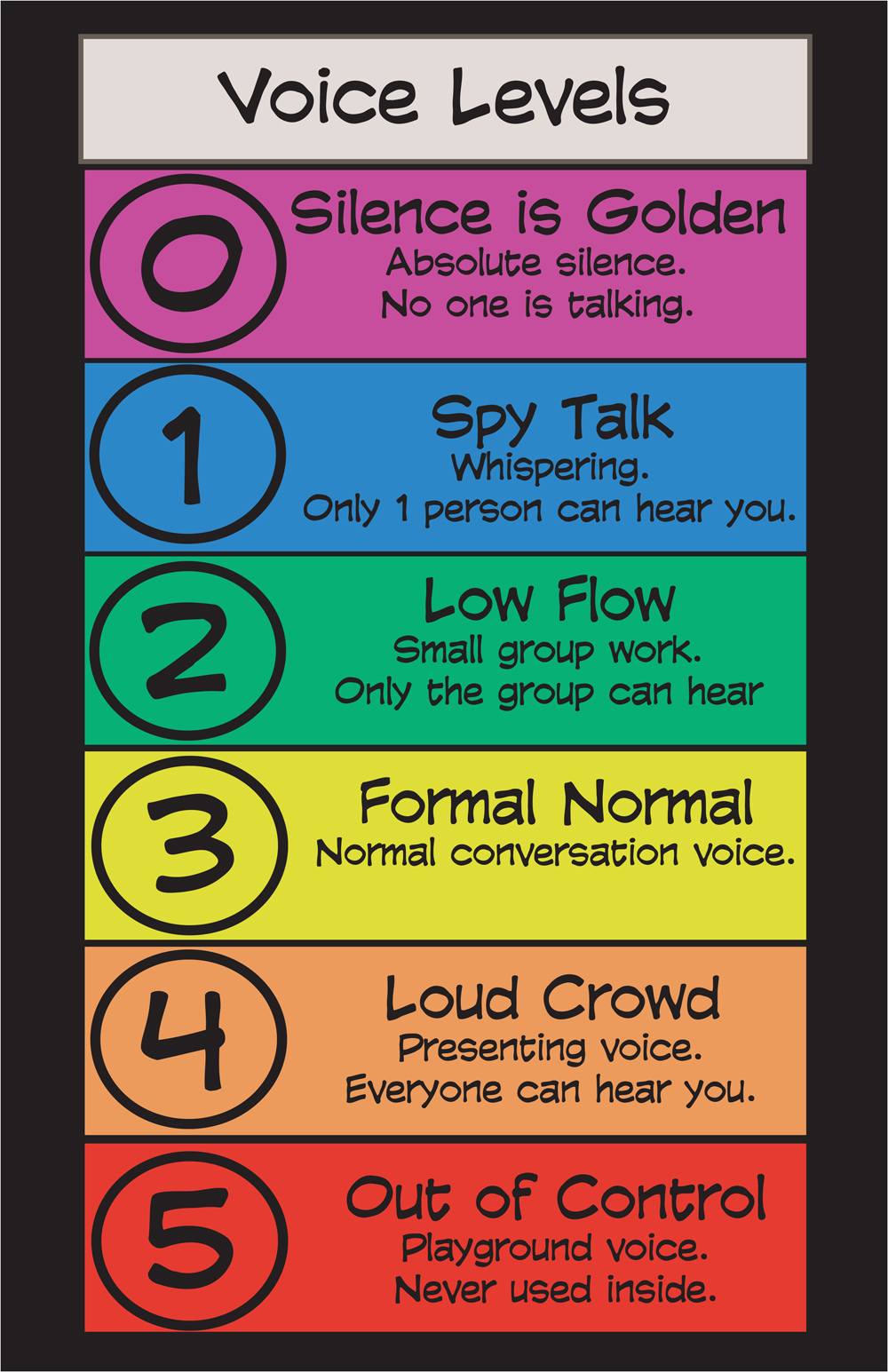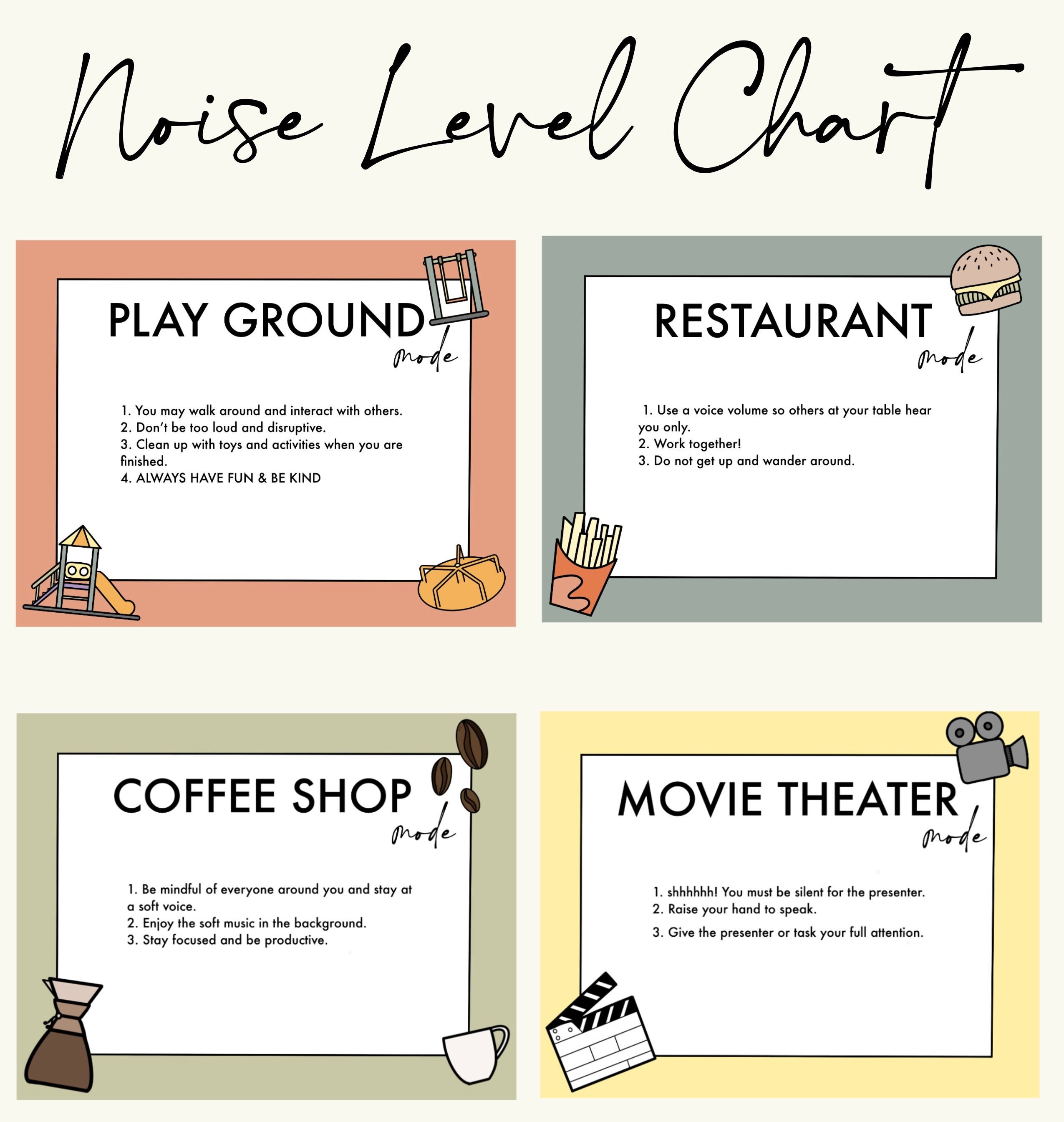
Voice/Noise Level Chart Eucalyptus Top Teacher in 2021 Noise level chart, Noise level
A classroom management tool to show noise level. Use your built-in microphone or plug in your USB microphone to enable this groovy noise level monitor. Adjust the microphone sensitivity to suit your microphone and classroom, (i.e. tinker with the slider until you like the sensitivity).

Voice Level Chart Classroom management, Voice level charts, Voice levels
Here are some of my favorite classroom noise management ideas. 1. N.O.I.S.E. This strategy involves either adding or removing a letter of the word "NOISE" anytime the class gets too loud. Whenever my class would get too loud, I would add one letter to the board. If they successfully worked quietly for a long period of time, I would remove a.

Just Another PB&J Day I ho, I ho, It's back to school I go! A freebie too!
This voice level chart makes it easy for students to "see" what the expected noise level in the classroom should be. Included, is one full page of the different noise levels (as shown in the thumbnail) and individual pages of the expected noise levels. Also included are arrows of various colors. My suggestion is that you laminate one of the arrows and then glue it onto a clothespin OR onto a.

Noise Level Chart Voice Levels FREE Noise level classroom, Noise level chart, Classroom charts
Noise-O-Meter is a great way to monitor the noise in your classroom. It is easy to use and really helpful! Simply cut out an arrow of your choice and stick it on the poster to indicate the level of noise in the classroom at a particular time. When you hear a decrease or increase in the sound, move the arrow up or down. Here is our newest IRREGULAR PAST PARTICIPLES MATCHING GAME! Check out our.

Voice / Noise Level Push Light Posters >Strong Speaker (The whole class can hear… Classroom
Simplistic, pastel noise level chart to display in the classroom. Numbered levels with images to support visual learners. Creative Commons "Sharealike" Review. 5 Something went wrong, please try again later. raara1. a year ago. report. 5. Great noise level chart for the upper primary years..

268 best Classroom management/PBIS images on Pinterest
Another free classroom noise monitor app is Too Noisy, which offers both a free version and a $8 paid version. Here, an indicator swings left and right on a dial, similar to a car speedometer. When class volume is low, the arrow stays in the green and yellow range. But when students get too loud, the arrow spikes into oranges and reds, warning.

The 25+ best Noise levels ideas on Pinterest Classroom noise level, Voice levels and Noise o meter
You can use these wonderful noise o-meter display posters around your classroom to display levels of acceptable noise. A noise level chart is a visual reminder to your students when it is appropriate to use a certain level of speaking, whether it is quiet working, partner or group voice levels. At the beginning of the task, ask students what is an appropriate level, discuss if necessary, and.

Noise level chart for kindergarten … Kindergarten anchor charts, Reading task cards, Effective
This will make your life easier and your classroom quieter! You likely talk to your students regularly about their voice levels and how to choose the right one based on different classroom activities. That's why we created this voice levels poster that you can save and print for free. Just submit your email here to receive your free poster.

Noise levels in the classroom Classroom management, Teacher time savers, Classroom charts
In the US, the American National Standard for Acoustical Performance Criteria, Design Requirements, and Guidelines for Schools, or ANSI S12.60 for short, requires unoccupied classrooms to have background noise of 35 dBA. The World Health Organization recommends the same level of 35 decibels (A-weighted) as safe.

2018.06.12 NOISE LEVELS CHART Resource Hear Entendre Québec
A free classroom noise level meter, monitor and management tool. Perfect if your school kids are too noisy! Bouncing balls react to sounds from the microphone. Bounce balls with your microphone! A fun way to manage classroom noise or visualize music.
MANAGING THE ART CLASSROOM NOISE
8. Bouncy Balls. Bouncy Balls via bouncyballs.org. How it works: The louder the classroom, the higher the balls fly! The goal is to keep the balls hanging out at the bottom. When the noise level rises too high, the program will alert students with a "Shh!" or loud beep—you choose.

The 25+ best Noise level charts ideas on Pinterest Classroom noise level, Voice level charts
Suggest a Resource. Noisometer (SB595) A printable 'noisometer' which can add some fun to your classroom whilst encouraging children to stay quiet. Includes a choice of arrows which can be fixed on with a split-pin and moved to the appropriate noise level, plus 3 'warning lights'.

Voice Level Chart Editable Voice levels, Voice level charts, Noise level classroom
Check out our classroom noise level chart selection for the very best in unique or custom, handmade pieces from our shops.

Voice Level Chart FREEBIE! Make Take & Teach Voice levels, Voice level charts, The voice
Simply print your poster and display it on or near the front of the room. Then you can use a peg or magnet to indicate the appropriate/expected noise level. Tip! Set the scaling on your printer and print in a larger size to make the chart easier for all students to see. You could even save the PDF file to your computer desktop and display it on.

Noise Level Chart Teacher Printables Classroom Voices Etsy
Our volume chart for classrooms details a list of numbers from 0 to 5 that indicates different noise levels. 0 means silence, while 5 means loud outdoor voices. The above video may be from a third-party source. We accept no responsibility for any videos from third-party sources. Please let us know if the video is no longer working.

Image result for noise level anchor chart Noise level classroom, Classroom charts, Classroom
Use the scale to educate your children about which voice levels are appropriate for different scenarios. Pin the chart up in your classroom and refer back to it to help your children feel confident about which voice to use and when. Get them involved and turn it into a fun activity with some prompt questions.